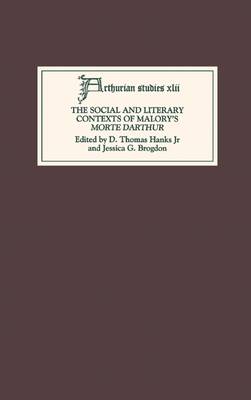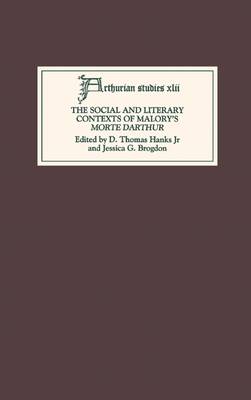
Je cadeautjes zeker op tijd in huis hebben voor de feestdagen? Kom langs in onze winkels en vind het perfecte geschenk!
- Afhalen na 1 uur in een winkel met voorraad
- Gratis thuislevering in België vanaf € 30
- Ruim aanbod met 7 miljoen producten
Je cadeautjes zeker op tijd in huis hebben voor de feestdagen? Kom langs in onze winkels en vind het perfecte geschenk!
- Afhalen na 1 uur in een winkel met voorraad
- Gratis thuislevering in België vanaf € 30
- Ruim aanbod met 7 miljoen producten
Zoeken
The Social and Literary Contexts of Malory's Morte Darthur
€ 177,45
+ 354 punten
Omschrijving
These studies look at Malory's 'Morte Darthur' as both literature and history. Insights into warfare and into contemporary attitudes to violence and the depredations of war are balanced by considerations of the literary context of the 'Morte', both with regard to the manuscript tradition of 'grete bokes', and the first printed version. Current critical attitudes to the 'Morte' are also examined, with the suggestion that Malory's intentions have been both imperfectly realised and understood. D. THOMAS HANKS Professor of English, Baylor University Many aspects of Malory's 'Morte Darthur' reflect contemporary literary and social issues, and it is this topic which forms the focus for the eight essays in the volume, all by leading Malory scholars. Terence McCarthy suggests that the 'Morte' was a book that came at the wrong time, and which we have admired for the wrong reasons. Andrew Lynch and D. Thomas Hanks Jr argue that Malory questions his culture's ideology of arms; Karen Cherewatuk and Kevin Grimm discuss the manuscript and printed contexts of the 'Morte'. Robert Kelly examines some of the political elements of the 'Morte'; Ann Elaine Bliss points out the role of processions in Malory's time and in the 'Morte'; and P.J.C. Field compares the 'Morte's' final battle to elements of the Battle of Towton (1461), finding strong similarities between the two.
Specificaties
Betrokkenen
- Uitgeverij:
Inhoud
- Aantal bladzijden:
- 168
- Taal:
- Engels
- Reeks:
- Reeksnummer:
- nr. 42
Eigenschappen
- Productcode (EAN):
- 9780859915946
- Verschijningsdatum:
- 4/11/2000
- Uitvoering:
- Hardcover
- Formaat:
- Genaaid
- Afmetingen:
- 156 mm x 234 mm
- Gewicht:
- 426 g

Alleen bij Standaard Boekhandel
+ 354 punten op je klantenkaart van Standaard Boekhandel
Beoordelingen
We publiceren alleen reviews die voldoen aan de voorwaarden voor reviews. Bekijk onze voorwaarden voor reviews.








